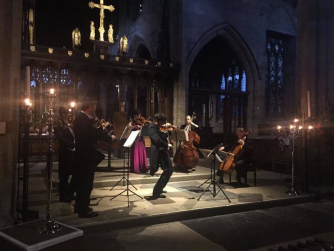Details
Cathedral Church of Saint Nicholas
St Nicholas Square
Newcastle upon Tyne
Tyne and Wear
NE1 1PF
England
Programme
Wolfgang Amadeus Mozart – Divertimento in D major, K.136/125a
Johann Sebastian Bach – Brandenburg Concerto no.5 in D major, BWV 1050
Antonio Vivaldi – Violin Concerto in G minor 'Summer', RV 315
Wolfgang Amadeus Mozart – Flute Quartet in D major, K.285
Johann Sebastian Bach – Brandenburg Concerto no.4 in G major, BWV 1049
Performers
Ben Norris – violin / director
London Concertante
Other concerts in this Series (+)
Programme Note
As part of our Brandenburg Concertos by Candlelight Season, the London Concertante travel to St Nicholas' Cathedral, Newcastle to perform two hallmark works of the Baroque era: J.S. Bach’s Brandenburg Concerto no. 4 & 5. Compiled as a set of six concertos in 1721, and dedicated to the Margrave of Brandenburg, Bach employed a varied and daring combination of textures throughout the pieces pushing new boundaries with each manuscript: the first is in four movements while the rest have three; the second boasts a contrapuntal masterclass with five soloists playing simultaneous; and the sixth has no violins! The works remain peerless in their singularness even today.
The fourth concerto in G major, scored for strings and solo violin and recorder (“Fiauti d’echo”), is a work fit for the royal courts of Prussia for which the composer intended, but also bursts with dazzling virtuosity. In the first and third movements in particular, the solo violin part is mesmerising. Though written for recorder, the work, in modern times, is also performed with flute. Interestingly, Bach also reduced this work for concerto on Harpsichord, BWV 1057. Speaking of harpsichords, the fifth concerto is perhaps the earliest example of a keyboard concerto in a fashion that the 21st century ear would recognise. Though formally scored as concerto for harpsichord, flute and violin, it is truly the keyboard player who comes to the fore. Influenced heavily by the Italian ritornello form of divided tutti and solo passages (omnipresent in Vivaldi’s concerto oeuvre) the harpsichord overtakes it’s soloist partners in dramatic fashion, particularly in the final passages of the first movement where it dominates the landscape with a kaleidoscopic demonstration of technical wizardry. Expect the harpsichordist to dress accordingly.
Also part of our wider 2018 Brandenburg Series across the UK, you can catch our Brandenburg programmes at Leicester, Sheffield, Manchester, St. Giles’s and Newcastle throughout the year!

 Your events at Classical Events
Your events at Classical Events

